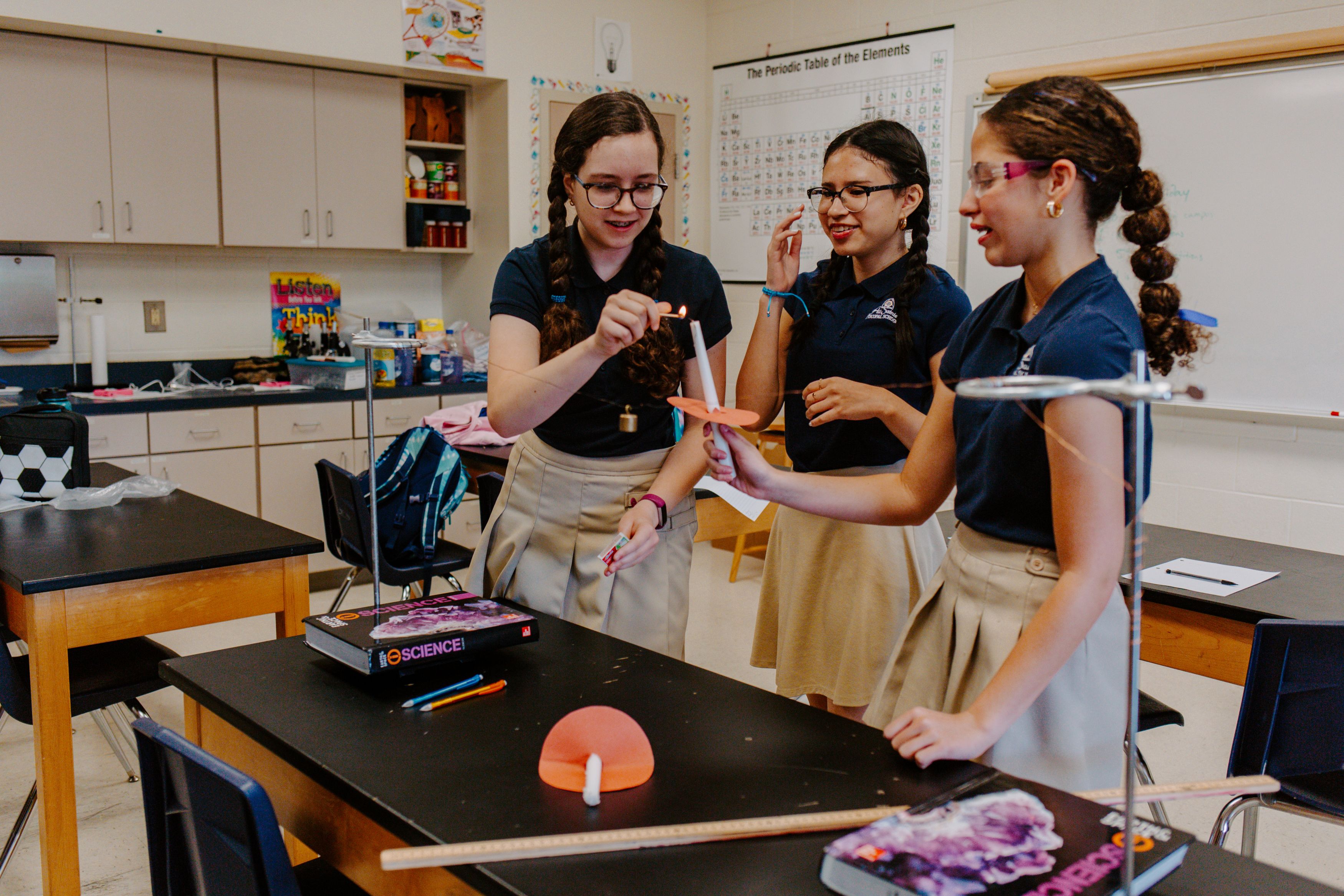
A student's Middle School experience is a pivotal point in their life. It greatly impacts them and develops them academically, emotionally, and socially.
Here are some specific examples of how an All Saints' Episcopal School experience can benefit students:
- Students are more likely to succeed academically. Studies have shown that students who attend independent schools tend to score higher on standardized tests than students who attend public schools. This is likely due to the smaller class sizes and the more rigorous academic curriculum offered at private schools.
- Students are more likely to be involved in extracurricular activities. This can help students develop their interests and talents and build relationships with their peers.
- Students are more likely to be prepared for college. Not only do All Saints' students do extremely well in their High School destination, but our strong curriculum prepares them to succeed beyond High School. An All Saints educational foundation can help students get into the college of their choice and succeed once they are there.
- Students are more likely to be well-rounded individuals. The close-knit community and the variety of opportunities offered at All Saints can help students develop their social, emotional, and intellectual skills.
Overall, an All Saints' Episcopal School experience can be a valuable one for students. It can help them succeed academically, get involved in extracurricular activities, and be prepared for college and beyond.
Middle School Team
English Language Arts and Social Studies
Teacher: Duane Andrews
Years Teaching: 21
What does he love about All Saints?
I love All Saints because it allows me the freedom to share my love of reading with students, and to help them understand that both reading and writing are simply different ways of thinking.
Science and Social Studies
Teacher: Teresa Harville
Years Teaching: 39
What does she love about All Saints?
I love the smaller class sizes at All Saints’ because I can really get to know my students and how they learn! “Success is not final, failure is not fatal: it is the courage to continue that counts.” - Winston Churchill
Math and Social Studies
Teacher: Kim Torres
Years Teaching: 20
What does she love about All Saints?
I love being at ASES because it allows flexibility in teaching that promotes a love of learning in each individual student. “Learn from yesterday, live for today, hope for tomorrow.” - Albert Einstein

Middle School English Curriculum
The middle school English curriculum typically covers a wide range of topics, including:
- Reading: Students will read a variety of fiction and nonfiction texts, including novels, short stories, poems, essays, and articles. They will learn to analyze and interpret these texts and to write about their understanding of them.
- Writing: Students will develop their writing skills in a variety of genres, including narrative, expository, persuasive, and creative writing. They will learn to plan, draft, revise, and edit their writing.
- Grammar and mechanics: Students will learn the rules of grammar and mechanics, and how to apply them in their writing.
- Literary analysis: Students will learn how to analyze literary texts, including understanding the plot, characters, setting, theme, and style.
- Vocabulary: Students will learn new vocabulary words and how to use them in their writing.
- Speaking and listening: Students will develop their speaking and listening skills, and learn how to participate in class discussions.
- Research: Students will learn how to conduct research and write research papers.
In addition to these core topics, middle school English students may also learn about other topics, such as:
- Poetry: Students will learn about the different forms of poetry, and how to write and analyze poetry.
- Drama: Students will learn about the different elements of drama, and how to write and perform plays.
- Media literacy: Students will learn how to critically analyze media texts, such as movies, TV shows, and advertisements.
- Composition: Students will learn how to write different types of compositions, such as letters, emails, and business documents.
- World literature: Students will learn about literature from different cultures and time periods.
The overall goal of the middle school English curriculum is to prepare students for the more advanced English courses they will take in high school and college.
Here are some of the specific skills that students are expected to learn in middle school English:
- Read and understand a variety of texts.
- Write effectively in a variety of genres.
- Use grammar and mechanics correctly.
- Analyze literary texts.
- Learn new vocabulary words.
- Speak and listen effectively.
- Conduct research and write research papers.
- Critically analyze media texts.
- Write different types of compositions.
- Learn about literature from different cultures and time periods.
Math
6th Grade
- Number sense and operations: Students will review and extend their understanding of whole numbers, fractions, decimals, and integers. They will also learn about operations with these numbers, such as addition, subtraction, multiplication, and division.
- Algebra: Students will be introduced to basic algebraic concepts, such as variables, expressions, and equations. They will also learn about solving equations and inequalities.
- Geometry: Students will learn about basic geometric shapes, such as triangles, squares, and circles. They will also learn about the properties of these shapes and how to measure them.
- Measurement: Students will learn about different units of measurement, such as length, weight, and volume. They will also learn how to convert between different units of measurement.
- Probability and statistics: Students will be introduced to basic concepts of probability and statistics, such as probability of events, mean, median, and mode.
In addition to these core topics, 6th-grade math students may also learn about other topics, such as:
- Data analysis: Students will learn how to collect, organize, and interpret data.
- Problem-solving: Students will be given opportunities to solve problems using the skills they have learned in math.
- Financial literacy: Students will learn about basic financial concepts, such as money management and budgeting.
The overall goal of the 6th-grade math curriculum is to prepare students for the more advanced math courses they will take in the future.
7th Grade - Pre-Algebra
- Real numbers: Students will review and extend their understanding of real numbers, including integers, fractions, and decimals.
- Algebraic expressions: Students will learn how to write and simplify algebraic expressions, including those with variables.
- Equations and inequalities: Students will learn how to solve equations and inequalities, including those with one and two variables.
- Exponents and logarithms: Students will learn about exponents and logarithms, and how to use them to solve problems.
- Geometry: Students will learn about basic geometric concepts, such as lines, angles, and shapes.
- Data analysis: Students will learn how to collect, organize, and interpret data.
- Problem-solving: Students will be given opportunities to solve problems using the skills they have learned in pre-algebra.
In addition to these core topics, 7th-grade pre-algebra students may also learn about other topics, such as:
- Matrices: Students will learn about matrices and how to use them to solve problems.
- Probability and statistics: Students will learn about basic concepts of probability and statistics, such as probability of events, mean, median, and mode.
- Financial literacy: Students will learn about basic financial concepts, such as money management and budgeting.
The overall goal of the 7th-grade pre-algebra curriculum is to prepare students for the more advanced algebra courses they will take in high school.
8th Grade - Algebra
- Linear equations: Students will learn how to solve linear equations in one variable, including those with fractions and decimals.
- Inequalities: Students will learn how to solve inequalities in one variable.
- Systems of equations: Students will learn how to solve systems of equations in two variables.
- Exponents and logarithms: Students will review and extend their understanding of exponents and logarithms.
- Geometry: Students will learn about more advanced geometric concepts, such as triangles, quadrilaterals, and circles.
- Data analysis: Students will learn how to collect, organize, and interpret data using statistical methods.
- Problem-solving: Students will be given opportunities to solve problems using the skills they have learned in algebra.
In addition to these core topics, 8th-grade algebra students may also learn about other topics, such as:
- Functions: Students will learn about functions and how to represent them graphically.
- Trigonometry: Students will learn about trigonometry and how to use it to solve problems.
- Probability and statistics: Students will learn about more advanced concepts of probability and statistics, such as hypothesis testing and sampling distributions.
- Financial literacy: Students will learn about more advanced financial concepts, such as investing and retirement planning.
The overall goal of the 8th-grade algebra curriculum is to prepare students for the more advanced algebra courses they will take in high school and college.
Science
6th Grade - Earth and Space Science
- The solar system: Students will learn about the planets, moons, asteroids, and comets in our solar system.
- The Earth: Students will learn about the structure of the Earth, including the atmosphere, hydrosphere, biosphere, and geosphere.
- Weather and climate: Students will learn about the different types of weather, how weather is formed, and how climate change is affecting our planet.
- Earth's resources: Students will learn about the different types of resources found on Earth, how they are used, and how they are being depleted.
- Earth's history: Students will learn about the formation of the Earth, the different eras of Earth's history, and the evolution of life on Earth.
- Space exploration: Students will learn about the history of space exploration, the different types of spacecraft, and the challenges of exploring space.
In addition to these core topics, 6th-grade Earth and Space Science students may also learn about other topics, such as:
- Astronomy: Students will learn about the stars, galaxies, and other objects in the universe.
- Geology: Students will learn about the formation and evolution of the Earth's crust.
- Paleontology: Students will learn about the study of fossils and the history of life on Earth.
- Environmental science: Students will learn about the different types of environmental problems and how to protect our planet.
The overall goal of the 6th-grade Earth and Space Science curriculum is to introduce students to the different aspects of Earth and Space Science and to help them develop an understanding of our planet and its place in the universe.
7th Grade - Life Science
- Cell structure and function: Students will learn about the different parts of a cell and how they work together.
- Biological molecules: Students will learn about the different types of biological molecules, such as proteins, carbohydrates, and lipids.
- Genetics: Students will learn about the basics of genetics, including DNA, genes, and inheritance.
- Ecology: Students will learn about the interactions between organisms and their environment.
- Evolution: Students will learn about the theory of evolution and how it explains the diversity of life on Earth.
- Human biology: Students will learn about the different systems of the human body and how they work together.
In addition to these core topics, 7th-grade Life Science students may also learn about other topics, such as:
- Botany: Students will learn about the different types of plants and how they function.
- Zoology: Students will learn about the different types of animals and how they function.
- Microbiology: Students will learn about the different types of microorganisms and their role in the environment.
- Environmental science: Students will learn about the different types of environmental problems and how to protect our planet.
The overall goal of the 7th-grade Life Science curriculum is to introduce students to the different aspects of Life Science and to help them develop an understanding of the living world.
8th Grade - Physical Science
- Matter and energy: Students will learn about the properties of matter, such as mass, volume, and density. They will also learn about the different forms of energy and how they can be converted from one form to another.
- Motion and forces: Students will learn about the different types of motion, such as linear motion, rotational motion, and projectile motion. They will also learn about the different forces that can act on objects, such as gravity, friction, and air resistance.
- Heat and temperature: Students will learn about the different ways that heat can be transferred, such as conduction, convection, and radiation. They will also learn about the different scales used to measure temperature.
- Light and sound: Students will learn about the properties of light and sound, such as reflection, refraction, and diffraction. They will also learn about the different ways that light and sound can be used.
- Electricity and magnetism: Students will learn about the basics of electricity and magnetism, such as circuits, conductors, and insulators. They will also learn about the different ways that electricity and magnetism can be used.
In addition to these core topics, 8th-grade Physical Science students may also learn about other topics, such as:
- The Universe: Students will learn about the different theories about the origin and evolution of the universe.
- Nuclear physics: Students will learn about the structure of the atom and the forces that hold it together.
- Particle physics: Students will learn about the smallest particles that make up matter.
- Astrophysics: Students will learn about the stars, galaxies, and other objects in the universe.
The overall goal of the 8th-grade Physical Science curriculum is to introduce students to the different aspects of Physical Science and to help them develop an understanding of the physical world.
Social Studies
6th Grade - World History
- The ancient Near East: Students will learn about the civilizations of Mesopotamia, Egypt, and the Indus Valley, including their political, social, and cultural development.
- The ancient Greeks: Students will learn about the development of Greek civilization, including the rise of democracy, the achievements of philosophy and science, and the influence of Greek art and literature.
- The ancient Romans: Students will learn about the rise and fall of the Roman Empire, including its political, social, and cultural development.
- The Byzantine Empire: Students will learn about the history of the Byzantine Empire, its role in the preservation of classical learning, and its impact on the development of Eastern Europe.
- The fall of the Western Roman Empire: Students will learn about the causes of the fall of the Western Roman Empire, the impact of this event on European history, and the rise of new civilizations in Europe.
In addition to these core topics, 6th-grade World History students may also learn about other topics, such as:
- The Celts: Students will learn about the Celtic peoples, their culture, and their influence on European history.
- The Vikings: Students will learn about the Vikings, their exploration and conquest of Europe, and their impact on European culture.
- The Americas before European contact: Students will learn about the different civilizations that existed in the Americas before the arrival of Europeans, including the Maya, the Aztecs, and the Incas.
The overall goal of the 6th-grade World History curriculum is to introduce students to the major events and themes in world history from the earliest civilizations to the fall of the Western Roman Empire.
7th Grade - World History
- The rise of Islam: Students will learn about the origins of Islam, the spread of Islamic civilization, and its impact on world history.
- The Crusades: Students will learn about the Crusades, the motivations for these religious wars, and their impact on European and Middle Eastern history.
- The rise of the Ottoman Empire: Students will learn about the history of the Ottoman Empire, its expansion into Europe and Asia, and its impact on world history.
- The Renaissance: Students will learn about the Renaissance, the revival of classical learning and culture, and its impact on European society.
- The Reformation: Students will learn about the Protestant Reformation, the split of Christianity into Protestant and Catholic branches, and its impact on European history.
- The Age of Exploration: Students will learn about the European exploration of the Americas, the impact of this exploration on the Americas and Europe, and the rise of European colonialism.
In addition to these core topics, 7th-grade World History students may also learn about other topics, such as:
- The Hundred Years' War: Students will learn about the Hundred Years' War, the conflict between England and France, and its impact on European history.
- The Black Death: Students will learn about the Black Death, the plague that killed millions of people in Europe, and its impact on European society.
- The Spanish Inquisition: Students will learn about the Spanish Inquisition, the persecution of Jews and Muslims by the Spanish Catholic Church, and its impact on Spanish society.
- The Columbian Exchange: Students will learn about the Columbian Exchange, the transfer of plants, animals, and diseases between the Americas and Europe, and its impact on both continents.
The overall goal of the 7th-grade World History curriculum is to introduce students to the major events and themes in world history from the Middle Ages to the Exploration of the Americas.
8th Grade - United States History
- The colonization of North America: Students will learn about the different European powers that colonized North America, the different Native American cultures that they encountered, and the establishment of the first permanent European settlements.
- The American Revolution: Students will learn about the causes of the American Revolution, the major events of the war, and the significance of the Declaration of Independence.
- The early republic: Students will learn about the formation of the United States government, the challenges that the new nation faced, and the growth of the country in the early 1800s.
- The westward expansion: Students will learn about the Lewis and Clark expedition, the settlement of the American West, and the Native American tribes that were displaced by this expansion.
- The Civil War: Students will learn about the causes of the Civil War, the major events of the war, and the significance of the war for the future of the United States.
- Reconstruction: Students will learn about the period of Reconstruction following the Civil War, the challenges of rebuilding the nation, and the end of Reconstruction.
In addition to these core topics, 8th-grade United States History students may also learn about other topics, such as:
- The Age of Jackson: Students will learn about the presidency of Andrew Jackson, the rise of democracy, and the impact of Jacksonian democracy on American society.
- The Mexican-American War: Students will learn about the causes of the Mexican-American War, the major events of the war, and the significance of the war for the United States.
- The Gold Rush: Students will learn about the Gold Rush, the impact of the Gold Rush on the American West, and the role of women and Chinese immigrants in the Gold Rush.
- The Industrial Revolution: Students will learn about the impact of the Industrial Revolution on the United States, including the growth of cities, the rise of the middle class, and the challenges of child labor.
The overall goal of the 8th-grade United States History curriculum is to introduce students to the major events and themes in American history from the colonization of North America to Reconstruction.





